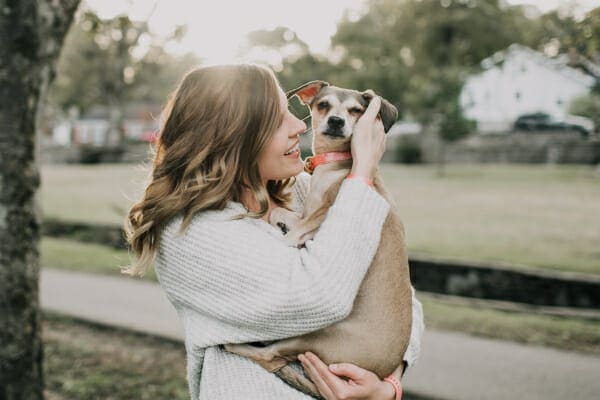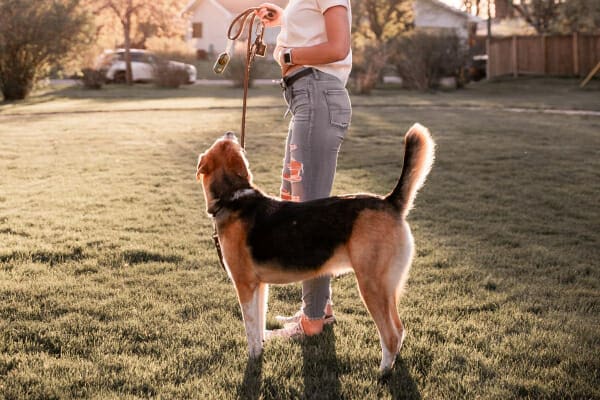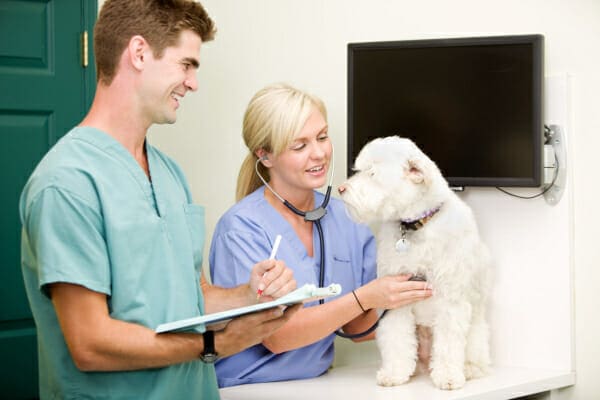Which dog vaccines are absolutely necessary? This is a common question and a good one. We all want to do what is best for our pups. To help you make that decision, integrative veterinarian Dr. Julie Buzby takes an in-depth look at dog vaccinations and gives her take on the answer to that question.

The idea of dogs going to the vet for their annual shots just because one year has transpired is as outdated as the idea that the earth is flat. Let me explain. I believe it is very important that your dog has annual (or semi-annual if your dog is a senior) wellness visits to the vet. And I believe that vaccinations have their place in keeping your dog healthy.
But I don’t believe that these visits are just for the purpose of vaccines. And I don’t believe that every dog needs the same vaccines on the same schedule. I think it is fair to say most vets now would agree.
You see, vaccinations do carry a high potential for benefit, but they are also inherently not without risk. And there is no “one-size-fits-all” approach when it comes to dog vaccinations. There is overwhelming scientific evidence that dog vaccine selection should be based on a dog’s individual risk factors (i.e. age, breed, lifestyle, and environment). So then, this raises the question, “Which dog vaccines are absolutely necessary?”
I promise I will give you some guidance on how to answer that question. But before I can do that, let’s chalk the playing field by understanding seven important facts about dog vaccinations.
1. Dog vaccines come in different types
The end goal of a vaccination is to help train your dog’s immune system to keep your dog safe. It exposes the body to something foreign to flag down the immune system. The vaccine says, “Hello, immune system, there’s something here that you need to react to.”
That something cannot actually cause the disease in the body, but the body doesn’t know that, so it sees it as the “real deal.” Think about it like a training exercise for the body. The cells that make up the immune system get to work on mounting a defense against that particular foreign invader. And they win because like I said, the vaccine doesn’t actually cause the disease.
Now the body is prepared should it ever encounter the actual disease causing organism. It knows its enemy and has prepared immune system soldiers and the proper artillery. These “immune system soldiers” are the cells that can recognize that invader and attack it specifically. Even if they are not called into action for some time, they are still ready and waiting.
The “artillery” is antibodies—specialized proteins the immune system creates to target the foreign invader for destruction. The body will keep some of the antibodies on hand and also hangs on to the “blueprint” for how to create more of them if needed.
There are three main types of training exercises (i.e.. vaccinations) that we use in dogs:

Killed (i.e. inactivated) vaccinations
As the name would imply, the organism in this type of vaccine is no longer alive. This means it isn’t particularly interesting to the immune system, so the vaccine typically also includes an adjuvant. The goal of the adjuvant is to direct the body’s attention to the killed organism and convince the body to mount an immune response.
Even with an adjuvant, the immune response may still be less substantial than with other vaccine types. This makes killed vaccines more likely to require a booster vaccine two to four weeks after the initial vaccine. This booster shot is kind of like a follow-up training exercise that hones the immune system’s skills and increases the size of the response.
Modified-live (i.e. attenuated) vaccinations
To create this type of vaccination, manufacturers weaken the organism so that it can still multiply in the body but cannot cause disease. This gives the body a chance to mount a strong immune response in the practice drill. That way it will be ready to respond if needed. Since the first dose tends to simulate a strong response, these vaccines are less likely to need a booster in two to four weeks (except in puppies, which we will get to in a bit).
Recombinant vaccinations
Instead of containing the whole organism, manufacturers create these vaccines by inserting a selected portion (or portions) of the disease-causing organism’s genetic material into the genetic material of another organism called a vector. The vector organism can multiply in the host (i.e. your dog). It will express the inserted portion of genetic material from the disease-causing organism.
The immune system will then mount a response that targets the selected portion of the disease-causing organism. While this sounds like something out of a science fiction movie, it actually provides great protection against the disease in question.
2. Vaccinations can be risky
We have established that vaccines stimulate the immune system. This is a good thing… except when it isn’t. Sometimes the immune system goes into overdrive after a vaccination. This may create an immediate vaccine reaction or potentially incite an auto-immune disease where the body attacks itself.

Mild vaccine reactions
You have probably heard this spiel from your vet after your dog has vaccinations. Dogs may experience some soreness at the injection site. You may notice a lethargic dog for a day or so and he or she may just feel a bit “lousy” for lack of a better description. These side effects are short-lived and relatively mild. They go along with an immune response, so they are somewhat par for the course.
Vaccine-induced anaphylaxis
However, some dogs will have an anaphylactic reaction to vaccinations. You may have heard of people are deathly allergic to bee stings or certain foods and have to carry and EpiPen in case of exposure. Well, that same sort of massively overblown immune response can happen in dogs, too. Signs of a severe allergic reaction include:
- Increased body temperature
- Hives
- Swelling, typically of the face and ears
- Vomiting and/or diarrhea
- Difficulty breathing or a dog who is breathing fast
- Low blood pressure
- Collapse
- Signs of shock (pale gums, elevated heart rate, etc.)
- Sudden death
Some dogs will rapidly begin to exhibit most of the signs on the list above. Untreated, anaphylaxis can quickly become life threatening. Thankfully, if the vet catches it right away, he or she can administer epinephrine (the drug in an EpiPen for humans), steroids, or anti-histamines, and systemic support such as IV fluids or oxygen therapy. I have seen several anaphylactic reactions in my 20-year veterinary career. Thankfully, I have never lost a patient to one.
Moderate vaccine reactions
So far we have addressed the two far ends of the spectrum for vaccine reactions. But there are some dogs who fall in the middle. They may only have hives and facial swelling or the GI signs and not full blown life-threatening anaphylaxis.
Sometimes it may be several hours before you notice appreciable swelling or hives. Other times your dog may start vomiting on the car drive home. That may complicate the situation because you have to decide if it is just car sickness or the start of a vaccine reaction.
To be safe, it is worth pulling over to check your dog for other vaccine reaction signs before writing it off as car sickness. And when in doubt, it is always better to call the vet.
It is also important to let your vet know if you think your dog may have reacted poorly to a vaccination in the past. Sometimes the reaction may be more mild the first time (i.e. GI signs or hives). However, the next vaccine reaction could be much worse, potentially to the point of being life-threatening. Often these reactions heighten over time.

Strategies to deal with moderate vaccine reactions
If your dog does have a moderate vaccine reaction, this doesn’t necessarily mean he or she can never be vaccinated again. The vet can give a “pre-treatment” injection prior to the vaccination. Or he or she may have you give some medications at home. Both of these options can help calm down the immune system and make a reaction less likely.
The vet may also have you wait in the lobby (or outside or in your car) for 30 minutes or so after the vaccination to ensure that your dog doesn’t start to react. Typically, I also try to schedule the patients with known vaccine reactions for morning appointments. That gives plenty of time for the owners to continue to monitor them at home before the end of the clinic day.
Finally, your vet may recommend splitting up the vaccines. This involves giving one vaccine every two to four weeks rather than multiple vaccines at once. I prefer giving the immune system at least three weeks to respond to one vaccine and get ready for the next one. However, it is often still safe to do them every two weeks (but no closer together).
Auto-immune diseases
The other danger with vaccinations is the possibility that the body will turn on itself. Sometimes a dog’s immune system starts out reacting to the vaccination, which is what we want. But then it starts reacting to its own cells. Some research indicates that there may potentially be a link between recent administration of vaccinations (among other things) and the development of immune mediated hemolytic anemia (i.e. the body attacking the red blood cells), immune mediated thrombocytopenia (i.e. the body attacking the platelets), immune mediated polyarthritis (i.e. the body attacking the joints), plus a variety of other conditions.
3. Vaccinations can save lives
I know I just finished telling you all the risks involved with vaccinations. But I want to make it clear that I am in no way “anti-vaccine.”
Vaccines have their place. They protect your dog’s health and human health, too. Vaccines are brilliant inventions that have saved countless lives. I have been a veterinarian for over 20 years, and early in my career I was an emergency veterinarian. So I understand quite well the benefit of vaccinations.
There is nothing sadder than caring for sick puppies in the isolation ward. You see, if they have a highly contagious disease like parvo or distemper, we can’t have them in the same ward with the other animals. So they go to isolation. Whenever anyone enters the isolation ward, they have to put on special booties, gowns, caps, and gloves. This keeps the vets and vet nurses from potentially carrying the disease to their other patients.

Hard lessons about why vaccines are important
I remember very vividly having a young dog in isolation early on in my career. He came in for coughing and a fever and we ended up figuring out he had distemper. He was in isolation for three days before he passed away. I can’t begin to describe the heartbreak of going in to care for him and wanting to rip off all my protective gear, pull him into my lap, and stroke him with my actual hands. But I couldn’t. And when he died, I thought to myself “Wow, this was preventable. A vaccine almost certainly could have prevented this.”
Canine parvovirus (i.e. parvo) causes another vaccine-preventable disease vets see commonly. These dogs have the most foul bloody diarrhea you can imagine. Their intestinal cells are literally sloughing off. I’m pretty sure that most vets and techs who have smelled that distinctive parvo diarrhea smell and cared for these extremely sick dogs would say that it made them a fan of vaccinations, if they weren’t already. There is nothing like watching a dog fight for his or her life (and often lose) while knowing that vaccinations could and should have prevented this.
Before we go any farther, I want to be clear that this discussion is not meant to make anyone feel guilty who has lost a dog to a vaccine-preventable disease. Sometimes puppies get sick when they are too young to have finished their vaccine series. Or the stray dog you rescued got exposed to a disease before you got a chance to get him or her vaccinated. Perhaps money was tight or you just didn’t know how important vaccines were at the time. I don’t intend to add to any guilt or shame you may already feel. In fact, my article of encouragement is worth the read: How to Be a Good Dog Mom: 3 Life Lessons from a Dog Mom Vet.
4. Vaccinations are classified into two categories
Now that you have a good basis for how vaccines work and some of the pros and cons, we can start to discuss the actual vaccinations your dog could potentially receive. Veterinarians typically view the American Animal Hospital Association (AAHA) as the authority on dog vaccine protocols. AAHA released the current version of their vaccination guideline in 2017 which classifies the vaccinations into “core” and “noncore.”
Core vaccinations
These are the vaccinations that all dogs should have just because they are dogs. These diseases are found commonly in most areas and often have high infection rates and high death rates.
AAHA considers the follow vaccinations to be core:
- Canine distemper
- Parvovirus
- Adenovirus (protects against infectious canine hepatitis)
- Rabies

Often the distemper, adenovirus, and parvovirus components are all contained in a combination vaccine which vets may refer to as a “DAP” vaccination. Sometimes the vaccination will also contain a parainfluenza component (a noncore vaccine), making it a “DAPP” vaccination.
It is important to note that sometimes vets in a particular region will consider other vaccinations as core. For example, while leptospirosis is a noncore vaccine per AAHA, there are areas of the country where it is very prevalent. Plus, it is zoonotic, which means dogs can transmit it to humans. For those reasons, a clinic may decide to treat leptospirosis as a core vaccine and recommend it for every dog.
Noncore vaccines
These are also know as “risk-based” or “optional” vaccinations. Depending on a dog’s lifestyle and exposure risks, they may or may not need protection against these diseases. Some of these diseases tend to be a bit less severe than the core vaccine diseases. And while these vaccinations do work, some of them may be less effective than the core vaccinations.
AAHA lists the following vaccinations as noncore:
- Bordetella (one cause of kennel cough)
- Leptospirosis
- Parainfluenza
- Lyme Disease
- Canine Influenza
- Western Diamondback Rattlesnake
In order to determine which of these noncore vaccines your dog should have, your veterinarian will perform a risk-based analysis.
5. The vet chooses vaccinations based on your dog’s risk factors
During your dog’s physical examination, your veterinary team will ask you questions about your dog’s lifestyle and exposure risk. This helps them get an idea of which noncore vaccines might be a good idea. They will also take into account your dog’s age, breed, and geographic location.

Lifestyle questions
Common questions include:
- Does your dog frequent dog parks or have lots of doggie play dates?
- Do you plan to take your dog to the groomer, obedience classes, doggie daycare, or a boarding facility?
- Does the dog live in a kennel or shelter environment or frequently visit those environments (i.e. a dog who goes to work with someone who works at a kennel, groomer, shelter, etc)?
- Do you take your dog to dog shows, agility events, or participate in other dog sports?
- Does your dog have contact with livestock or spend time where livestock used to live? Or walk or lay on soil where livestock or wildlife could have urinated?
- Does your dog swim, wade, or play in, or drink from bodies of water (i.e. lakes, rivers, streams, puddles, etc.)?
- Are there numerous wild rats living in your area?
- Does your dog live in or travel to an area with many ticks?
- Is Lyme disease common in your area or do you plan to travel with your dog to an area where Lyme disease is prevalent?
- Do you live somewhere that your dog may come in contact with Western Diamondback Rattlesnakes?
- Do you live near the woods or take your dog hunting or hiking?
Based on how you answer these questions and how common certain disease are where you live, the veterinary team can recommend the noncore vaccinations that your dog truly needs. This risk analysis is a great way to avoid giving your dog vaccinations that are not necessary. If you are interested in learning more about vaccine selection, AAHA has a lifestyle-based vaccine calculator. This great tool is accessible to dog parents and the veterinary team.
6. Many factors determine how often your dog should be vaccinated
For most dogs, your vet will recommend repeating the core and noncore vaccines on a set schedule as described by the AAHA guidelines. The exact schedule depends on:
- The age of the dog (puppy under 16 to 20 weeks old versus adult)
- Previous vaccination history (i.e. has the dog been vaccinated for that disease and when the last vaccine was given)
- Type of vaccination (i.e. killed versus modified live versus recombinant and the disease it protects against)
Vaccination schedule for puppies
Puppies typically need a series of vaccinations. This is because the immunity they receive from their mother at birth can make a vaccination less effective. As the puppy gets older, the maternal immunity decreases, allowing the immune system to mount a more effective response.
On an individual level, there isn’t a simple way to determine how much maternal immunity a puppy has at any given stage. That means we can’t practically know how effective the vaccination will be at any point in time. Thus, giving a series of vaccines helps ensure the puppy will develop good immunity by repeatedly showing the immune system the vaccination.
Puppies, due to their immature immune systems, also tend to be at a higher risk for contagious disease when compared to adult dogs. This makes it especially important that they are protected from these diseases. Giving a DAP (or DAPP) vaccination every three to four weeks from six weeks until 16 to 20 weeks of age is a good way to help ensure (to the best of anyone’s abilities) that these puppies are protected against distemper, adenovirus, and parvovirus. Reducing exposure to these diseases by being wise about where you take your young puppy is also very important.

Adult dog vaccination schedules
Adult dogs, on the other hand, have a more mature immune system. They typically only receive vaccinations every one to three years (although this can vary) after the initial vaccine series. The periodic vaccination helps remind the immune system to keep up its defenses. Sometimes if the vet recommends a “new” vaccine the dog hasn’t had before (for example, Lyme Disease), the dog may need an initial vaccination and a booster two to four weeks later to create good immunity.
Vaccine titers
In recent years, using vaccine titers to gauge when or if to revaccinate a dog has gained popularity. This involves using a blood test to measure how many antibodies (i.e. how much immunity) a dog has against a certain disease. If the dog has sufficient antibodies, it is likely that the dog should be protected against the disease if exposed to it. If the levels are low, this may mean that revaccination is necessary (but that is not always the case).
AAHA has some great resources that vets can use to help interpret vaccine titers in various situations. It is important to note, though, that AAHA only recognizes titers for parvovirus, distemper, and adenovirus as being valid. Also, if an organization requires vaccines for boarding, grooming, showing, etc., they may or may not accept titers instead.
If you are interested in having titers run on your dog, I would recommend looking for a veterinary clinic that is accustomed to running and interpreting them. They will have the most familiarity and comfort with using titers to help guide vaccine decisions.
Titers can be significantly more expensive than vaccinations. However, they may be a good option for those dog parents who don’t want to vaccinate their dogs as frequently but do want to try to ensure their dog is protected.
Rabies and the law
It is also possible to determine rabies titers. However, rabies vaccination is mandated by law every three years for adult dogs in most states. As such, proof of positive rabies titers typically does not allow the vet to waive rabies vaccination requirements. Rabies is zoonotic (i.e. transmissible to people) and fatal in almost all cases. It should be no surprise that vets, human doctors, and health departments take rabies seriously.
In some situations, such as an anaphylactic reaction or high suspicion that the rabies vaccine induced an auto-immune disease, a vet may be able to work with the health department to get a rabies exemption. This varies on a state-by-state and case-by-case basis.
7. Vaccinations are only one of many reasons why a wellness exam is important

Regardless of your views on vaccination, a yearly (or twice yearly for seniors) exam is still very important for your pup’s overall health. It gives your vet a chance to look your dog over from nose to tail.
During this examination, your vet can determine your dog’s body condition score (BCS) to detect any problematic weight changes. If your dog is overweight, your vet can explain how to help your dog lose weight. Or the BCS might reveal your dog has lost a significant amount of weight without an obvious explanation. In this case, your vet may want to run some diagnostic tests to ensure the weight loss isn’t a sign of a bigger problem.
The examination also allows your vet to evaluate your dog’s teeth for painful dental disease in dogs. Plus he or she can check for ear infections in dogs, take your dog’s vital signs, palpate the abdomen for masses, evaluate your dog’s skin, screen for signs your dog is in pain, and so much more.
Your vet can also discuss intestinal parasite and heartworm disease in dogs prevention to help keep your dog healthy. And it also gives him or her the chance to perform screening tests such as a fecal, urinalysis, heartworm and tick borne diseases in dogs testing, or baseline bloodwork. These tests can detect a problem before it actually creates a problem for your dog.
Which dog vaccines are absolutely necessary?
And now, the moment you have been waiting for—the answer to the question about which vaccines are necessary for your dog. As you have probably gathered by now, vaccinations are a complex subject. And in many ways, we have barely scratched the surface of all there is to know about vaccinations.
Like I said at the start, there is no one-size-fits-all approach to vaccines. So, unfortunately, that does mean that I can’t tell you “every single dog must have xyz vaccinations at this particular interval.”
While I will give you some generalities, a discussion with your vet is the best way to make these decisions.
- Rabies is required by law, zoonotic, and almost always fatal, so that one is typically pretty clear cut.
- Parvovirus, distemper, and adenovirus are still out there killing dogs. So most dogs need protection against these three diseases (be that routine vaccination on a schedule or using titers to assess immunity after the initial vaccination series).
- And the rest? It just depends on all those risk factors we discussed above.
I can’t emphasize this enough. The the best thing you can do is to work closely with your vet to formulate a vaccination plan for your dog. Talk about the pros and cons of vaccination. Discuss your dog’s risk factors. Decide if you want to use titers to assess immunity, vaccinate at the AAHA recommended intervals, or do something else.
Your vet is your ally. He or she has years of scientific training, and is well versed in vaccinations. So work together as a team to determine what is best for your dog.
How do you decide which vaccines your dog should get?
Please comment below.


Our dog was diagnosed with ITP we spent thousands to save her. my vet at the time did not recommend any vaccines for her due to not knowing what caused it. We did blood work to determine she still showed signs of the vaccines and rabies vaccine. she is now due for vaccines and the vet that treated her is retired. The new vet wants her to have vaccines. what do we do? We only do heartworm and lymes year round.
Hi Cathy,
I understand your concern for your pup and think it is great you are searching for advice. I agree, the thought of giving another vaccine is worrisome but can see why your vet would recommend them. Just because vaccines have been recommended doesn’t mean you are required to give them (rabies can be an exception depending on the laws in your state). You can ask to have titers performed instead to see if there is still adequate immunity present. Also, it is ok to get a second opinion or seek the services of a different veterinary hospital. You deserve to feel comfortable with the care your girl is receiving, and every clinic is not the best fit for every client. I do think it would be good to have an honest conversation with your vet about your concerns and see what solution they can come up with. Wishing you all the best of luck and keep up the good work!
hello my pug mix dog hasn’t been to a vet or had any shots in almost 11 years he’s 13 now and I have a vets visit on the 6th of May and I’ve read the lists of shots to get my Mr. shia and my anxiety is through the roof worrying about taking him to the vets so in that saying what shots would you recommend and do I have anything to worry about cause he is getting old but he’s very active so if you get back to me it would be great
Hi Tj,
I understand your concern for your senior guy. It is hard to make vaccine recommendations without having all the important information. When we (vets) make recommendations about vaccinations we take many things into consideration such as: lifestyle, environment, state laws, the individual dog’s risk factors, health, etc. As the article states, some vaccines are considered CORE vaccines and others are optional. I would encourage you to discuss your concerns with your vet on the day of the appointment. They will let you know what they think is best for your sweet boy. Don’t forget that just because your vet recommends a vaccine or treatment doesn’t mean you have to do it. Ultimately, the choice is yours! This is why it is so important to have a good working partnership with your vet and establish trust. Hoping your visit will go smoothly and be very informative. Wishing you and Mr.Shia all the best!
Can you give me your opinion on Heartworm medication? Is it necessary? I have spoken to a couple of breeders who are totally against giving Heartworm medication.
Hi Kathy,
I have heard this from many people over the years and am glad you reached out for advice. YES! I believe heartworm prevention is absolutely necessary. I keep all of my dogs on heartworm prevention every month year round. Here is a link to another article with more information: Heartworm Disease in Dogs: The 10 Deadly Myths
I would never want to put one of my dogs at risk for sudden death or lifelong complications when this disease is so easily preventable. Also, most heartworm preventatives also deworm for intestinal parasites. Many of these parasites can be transmitted to people. So, in my opinion, heartworm prevention is a great way to keep you pup and your family protected.
It’s great that you pointed out how pet vaccination shots could protect your dog’s health and human health too. We just bought a new puppy and it seems he doesn’t have vaccine shots yet. So for that, we should definitely visit the vet this weekend and ask for vaccines.
Hi Luke,
Yes! Much of what we do in veterinary medicine is to protect human health and prevent the spread of disease. I hope you have a great first visit with your new pup!
My ShihTzu was diagnosed with IMHA three years ago. He was in Intensive Care for ten days and had numerous blood transfusions before he finally turned around. He needs his teeth cleaned now, but I am leary to have him sedated because of his health history. He hasn’t received any vaccines in three years either.
Hi Sherry,
I understand your concern about anesthesia with the other issues your dog has experienced. I highly recommend you schedule a consult with a veterinary dentistry specialist. They would be able to evaluate your pup’s dental issues and let you know if a full cleaning under anesthesia is the best recommendation or if other treatments are available. Best wishes and good luck!
My boyfriend gave me a dog last Christmas and it’s my first time owning a pet. Very interesting to know that the vet is actually the one deciding what vaccinations you would get depending on the animal’s lifestyle, risks, age, and location. I’d have to take her to the vet soon so I’d know which ones we need to have.
Hi Claire,
Congratulations on the addition of your new dog! I hope your first vet visit goes well and that it will be the beginning of a great partnership that will last the lifetime of your dog. Be sure to make a list of any questions you have so you can discuss any concerns with your vet. Good luck and best wishes!
Please help, went with my puppy for his last set on necessary vaccines; was give. 4 extra treatment/ vaccines without my consent. Specifically bordetella and Corona.
My question is Corona vaccine against SARS-CoV-2 virus. ? Because I was told it was against some other intestinal virus by the same name
Hi Mariana,
The Corona virus we vaccinate dogs for is not the same Corona virus that causes COVID in people. You are correct, that the Corona virus we vaccinate for in dogs causes GI symptoms and not respiratory issues. While Corona and Bordetella are not considered “core” vaccines, they are very common. Most groomers and boarding facilities will require the Bordetella vaccine to help prevent Kennel Cough in their places of business. If there are any concerns with vaccines or what diseases they prevent, I recommend you talk with your vet. You can decide together what to vaccinate your dog for in the future and make sure you are comfortable with the decisions being made. I feel like your puppy has received the standard of care and should be well protected. Best wishes to you both on many happy years ahead!
I loved that you said that vaccines can save dogs’ lives, and they can ensure that dogs won’t carry diseases to other patients. This is something that I will share with my son so he could have his 8-week old Labrador vaccinated within the week. He loves his dog, and he wants to keep it healthy for a long time.
Hi Shammy,
Thank you for the kind words. Now is a great time for your son to get established as a client with a local vet. I hope your son will find a vet that he can partner with for the life of his Labrador. Best wishes to you and yours!